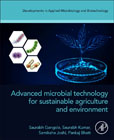
Advanced Microbial Technology for Sustainable Agriculture and Environment
Gangola, Saurabh
Kumar, Saurabh
Joshi, Samiksha
Bhatt, Pankaj
Advanced Microbial Technology for Sustainable Agriculture and Environment focuses on plant-microbe interactions in respect to bioremediation and plant growth promotion, providing insights on diverse approaches such as genomics, metagenomics, proteomics, bioinformatics and other high-throughput analyses of environmentally relevant microorganisms. The impact of frequent applications of potentially toxic chemicals (pesticides and fertilizers) and increased industrialization processes on microbial diversity emphasizes the potential threat to microbial biodiversity in ecosystems. This is an ideal resource on current trends and the future of PGPR developments with bioremediation potential. Moreover, it gives a deep understanding of the genetics of microbial biodegradation and different remediation mechanisms that help to re-establish the natural environment. Helps readers find sustainable ways for environmental clean-up and increased agricultural productivity Gives a systematic overview of the role of PGPR in bioremediation, selection and preparation of potential PGPR microbial inoculum for bioremediation, biodegradation and plant growth promotion Illustrates the importance of PGPR in the bioremediation of potentially hazardous and relatively novel compounds with the maintenance of sustainable agricultural productivity Addresses emerging novel approaches of PGPR-based biodegradation of toxic compounds and highlights key developments and challenges associated with the processes INDICE: 1. Microbial diversity and its application for plant growth promotion and bioremediation 2. Plant microbe interactions: signalling and perception 3. Role of plant growth promoting bacteria in sustainable agriculture 4. Rhizosphere metagenomics: applications in plant microbes' interactions 5. Recent molecular and omics approaches to study rhizosphere functioning 6. Rhizosphere engineering for sustainable agriculture 7. Cultivation of unculturable microorganism: latest advancement and applications 8. Microbial enzymes and their mechanisms for plant growth promotion 9. Microbial inoculants and their impact on plant and soil health 10. PGPR mediated mitigation of biotic and abiotic stress in plants 11. Microbes as a biofertilizer and biopesticides for sustainable agriculture 12. Role of psychrophilic or psychrotolerant microorganism towards the development of hill agriculture 13. Genetic engineering in plant growth promontory microorganisms: opportunities and obstacles. 14. Tracking of microbial inoculants in agriculture soil 15. Fungal and bacterial diversity towards xenobiotic compound degradation 16. PGPR mediated bioremediation of toxic pollutants for sustainable environment and human health 17. Mitigation of soil heavy metal contamination through PGPR 18. Role of PGPR in arsenic bioremediation in agriculture crops 19. Microbial exopolysaccharide (EPS): its application in degradation of environmental pollutants 20. Technological advancement in tool and techniques used for biodegradation analysis 21. Mechanisms of microbial based biodegradation of environmental pollutants 22. Microbial nanotechnology for the development of sustainable agriculture and environment 23. Role of nanoparticles in soil heavy metal bioremediation 24. Insight into microbial metabolic pathways for degradation of different xenobiotic compounds 25. Role of microorganism in agricultural waste management 26. New insights into the enzymatic catalysis for the degradation of toxic chemicals 27. Future of PGPR based plant growth promotion and bioremediation technologies 28. The role of hidden microbes for sustainable agriculture and environment
- ISBN: 978-0-323-95090-9
- Editorial: Academic Press
- Encuadernacion: Rústica
- Páginas: 480
- Fecha Publicación: 01/10/2022
- Nº Volúmenes: 1
- Idioma: Inglés
